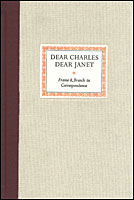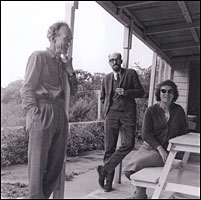If poets die young
they bequeath two thirds of their life to the critics
to graze and grow fat in
visionary grass.
If poets die in old age
they live their own lives
they write their own poems
they are their own might-have-been.
Young dead poets are prized comets.
The critics queue with their empty wagons ready for hitching.
Old living poets
stay faithfully camouflaged in their own sky.
It may even be forgotten they have been shining for so long.
The reminder comes upon their falling
extinguished into the earth.
The sky is empty, the sun and moon have gone away,
there are not enough street bulbs, glow-worms, fireflies to give light
and for a time it seems there will be no more stars.
they bequeath two thirds of their life to the critics
to graze and grow fat in
visionary grass.
If poets die in old age
they live their own lives
they write their own poems
they are their own might-have-been.
Young dead poets are prized comets.
The critics queue with their empty wagons ready for hitching.
Old living poets
stay faithfully camouflaged in their own sky.
It may even be forgotten they have been shining for so long.
The reminder comes upon their falling
extinguished into the earth.
The sky is empty, the sun and moon have gone away,
there are not enough street bulbs, glow-worms, fireflies to give light
and for a time it seems there will be no more stars.
--
This poem was one of many that Janet Frame (1924-2004) never published in her lifetime. The Pocket Mirror appeared in the late 1960s in the UK, America and New Zealand and has never been out of print, and many of the poems have become classics.
This poem was one of many that Janet Frame (1924-2004) never published in her lifetime. The Pocket Mirror appeared in the late 1960s in the UK, America and New Zealand and has never been out of print, and many of the poems have become classics.

"Poets" was first published posthumously in The Goose Bath (Random House NZ 2006; Wilkins Farago Australia 2008) and in Storms Will Tell (Bloodaxe Books UK, USA 2008).
Janet Frame showed this poem to her friend Landfall editor Charles Brasch on one of his visits to her house in Dunedin, but she refused to let him publish it. After Charles died in 1973, Janet sent a copy of the poem to another grieving friend of his, Margaret Scott. Janet described showing Charles the poem:
"That afternoon he asked me what I’d been writing and I was bold enough to say I had written a poem and then bold enough to get it when he asked me to show it to him. This was so unlike me, for I never show things if I can help it.
The poem was about the deaths of two poets, one in youth, the other in age. Charles liked it and suggested I send it to Landfall, which I never did, in fact I've never sent it anywhere. He liked it but he did not think it ‘wonderful’ or anything like that, nor did I, for it’s full of stupidities. We talked then about death in youth and in age, and Charles again suggested I send the poem to Landfall. He wanted people to read it and think about it. I'm sending it to you. I knew it would find its home one day."
The whole of the letter to Margaret Scott appears in Dear Charles, Dear Janet: Frame and Brasch in Correspondence which is a hand printed fine edition recently published by the University of Auckland's Holloway Press.




Since its first publication 'Poets' has struck a chord with many readers, and I know that it has already been read out at several funerals. The self-effacing Janet Frame may well have identified 'stupidities' in the composition of the poem, according to her own impossibly high standards, but she was correct in her belief that her words might also bring comfort to those facing the realities of death.
The poem has also been set to music by Jenny McLeod and the song based on it was first performed at the Wellington Festival of the Arts in 2008.
Pamela Gordon is this week's Tuesday Poem Guest Editor. She lives in Dunedin and works for the Janet Frame Literary Trust. The latest news from the Janet Frame Estate is posted at An Angel @ My Blog. Pamela has had her own poetry published in anthologies and periodicals, and occasionally takes part in poetry readings. She is currently co-editing a collection of Janet Frame's non-fiction.

8 comments:
This is such a wonderful poem - and so true! So much better to pop your clogs when you are full of potential rather than when you've exhausted it!! I was really fascinated by the letter to Margaret Scott - I've had a lot of correspondence (and conversations) with her while she's been transcribing Charles Brasch's diaries and letters. She is a very remarkable woman. I don't think I could ever dedicate my life to preserving someone else's literary heritage. Much too selfish!
I read this poem on several different levels--the contrasting of the traditional "hero's choice" of burning brightly but dying young, with spending a lifetime with one's art, and also the clearly scathing opinion of critics, which reminded me quite a lot of the sentiment in Dire Straits' "In the gallery" (Track 7 in the album, "Dire Straits)"--although equally clearly there is absolutely no connection between the two! I am also intrigued at how different my reading was to Jenny's, in that I don't read the poem as necessarily asserting that to die young is better than the alternative, since when the aged poets do fall "for a time it seems there will be no more stars."
But that's the wonderful nature of poetry---once the words are sent 'out there' into the world, the process becomes participatory with every reader having their own 'take' on meaning.:)
A very sobering poem there Mary, on so many levels.
She really was such an amazing writer.
Wonderful poem! Thanks for the introduction toe Janet Frame.
I couldn't help thinking about the recently deceased Harvey McQueen when reading this poem by Janet Frame. Harvey loved the writing of Janet Frame and he also was one of our "old living poets" who, when he died, I think all of his fellow Tuesday Poets felt that "for a time it seems there will be no more stars."
I love the last elegiac five lines of this poem. Very beautiful.
It's glorious poem, filled with carefully judged and beautifully balanced sorrow and pleasure, and I'm so glad to have been introduced to it. Many thanks!
great, thanks
Post a Comment